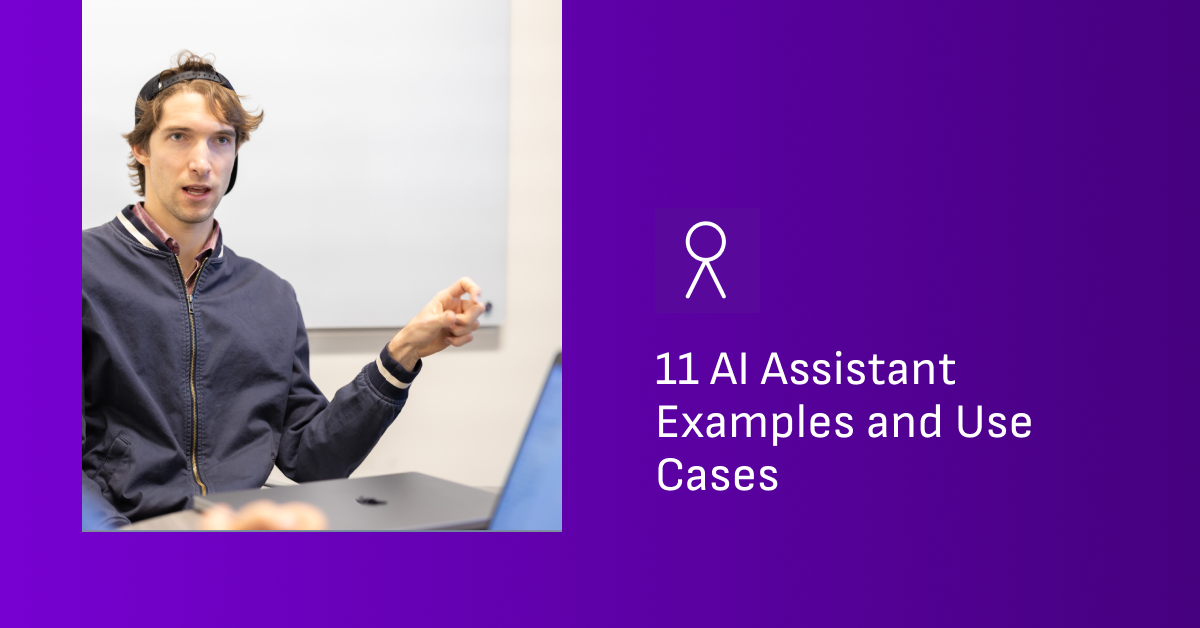Artificial intelligence (AI) can take on many roles — including that of a timesaver, creative muse, problem solver, and efficiency booster.
AI is no longer a distant concept, but rather an ever-present force working discreetly in the background, enhancing our daily routines and revolutionizing the way we approach tasks.
In fact, in today's fast-paced business landscape, AI has emerged as a critical force driving productivity, innovation, and competitive advantage. With an emphasis on practicality and tangible results, AI is changing how businesses approach challenges and unlock new opportunities.
Join us as we delve into the captivating world of enterprise AI applications and explore this technology’s impact across a diverse array of industries and essential business functions. Together, we'll examine the underlying potential of AI to optimize processes, amplify workforce capabilities, and redefine corporate landscapes.
Here’s what we’ll cover:
- What is AI?
- What is AI used for?
- Why use AI in business?
- Examples of AI
- AI applications
What is AI?
When we talk about artificial intelligence (AI), we refer to the remarkable fusion of technology and complex algorithms that enable machines to emulate human-like thinking and learning capabilities.
Have you ever been amazed by a self-driving car that can navigate busy streets and make real-time decisions independently? That's AI in action! By programming machines to carry out tasks that traditionally require human intelligence, AI has transformed our world and initiated a new era of innovation and efficiency.
What is AI used for?
AI has an incredibly versatile range of applications that cater to diverse industries and sectors. From automating mundane tasks to making informed data-driven decisions, AI is truly changing the way businesses and individuals operate. Some common AI applications include:
- Enhancing customer experiences with chatbots and virtual assistants
- Streamlining information search using natural language processing (NLP)
- Optimizing operations through smart forecasting
- Identifying trends and patterns in data to facilitate informed decision-making
But that list is barely scratching the surface. By leveraging the capabilities of AI, organizations and individuals alike can effectively address challenges, harness opportunities, and positively transform their routines and processes.
What are some examples of AI in daily life?
It might surprise you, but AI is already deeply enmeshed in our daily lives, often operating behind the scenes to enhance the products and services we use every day.
While, by now, ChatGPT is a familiar AI presence, it's far from the only one. Numerous aspects of our daily routines benefit from AI, as they improve the products and services we depend on. Here are some examples of AI in the real world:
- Navigation and Ride-Hailing Applications: AI powers Google Maps to estimate arrival times, suggest the best routes, and provide real-time traffic updates. It also supports ride-hailing apps like Uber and Lyft to determine estimated arrival times and optimal matchings between drivers and passengers.
- Face Detection and Recognition: Social media platforms and smartphones use AI to accurately detect and recognize faces within photos, allowing for seamless tagging, organizing, and identification.
- Text Editors and Autocorrect: AI works behind the scenes in your text editors, helping to predict and correct typos, suggest sentence completions, and implement grammar checks.
- Search and Recommendation Algorithms: AI-based algorithms enhance your search engine experiences by delivering highly relevant results based on your query and personalizing online shopping experiences with product recommendations tailored to your preferences.
TV Show Recommendations on Streaming Platforms: AI is the driving force behind personalized TV show and movie recommendations on streaming platforms like Netflix, Hulu, and Amazon Prime Video. By analyzing our viewing habits and preferences, these platforms curate tailored content suggestions, continuously enhancing our streaming experience and making it easier to discover new shows and movies to enjoy.
Why use AI in business?
AI has established itself as a game-changer for businesses in various industries. The numerous advantages of AI solutions contribute to not only improved operational efficiency but also a more strategic approach to problem-solving. Here are some key reasons why AI has become essential for modern businesses:
- Unlocking Software's Full Potential: Generative AI allows users to fully utilize complex software, ensuring that valuable features are effectively employed to their maximum advantage.
- Cost Savings: By automating repetitive and mundane tasks, AI helps streamline processes, leading to significant savings in operational costs and resources.
- Reducing Busy Work: AI can handle time-consuming routine tasks, allowing employees to concentrate on strategic and creative aspects of their work—resulting in higher job satisfaction and employee retention.
- Enhanced Productivity: With AI-powered tools and solutions, businesses can optimize their workflows, enabling teams to focus on high-value tasks while AI takes care of the rest.
What are AI applications?
AI applications encompass a multitude of practical implementations that harness the power of artificial intelligence to streamline operations, tackle complex problems, and drive innovation within various fields.
AI in Agriculture
AI has made significant strides in the agriculture industry, enabling smarter and more sustainable farming practices.
By leveraging advanced technologies such as data analytics, machine learning, and computer vision, AI-powered solutions help farmers monitor crop health, optimize irrigation, and manage pests more efficiently. As a result, the agriculture sector has experienced increased productivity, reduced resource wastage, and improved crop yields — all while minimizing environmental impact.
AI in Artificial Creativity
AI has ventured into the realm of creativity, giving rise to a new wave of AI-generated art, music, video, and design.
By leveraging machine learning algorithms, particularly Generative Adversarial Networks (GANs) and natural language processing (NLP), AI systems can now create original compositions, captivating visuals, and even persuasive writing. This fusion of artificial intelligence and human creativity has resulted in a unique collaboration between machines and artists, pushing the boundaries of traditional creative processes and opening up a world of endless possibilities.
AI in Automotive
AI plays a crucial role in the automotive industry, particularly in the development and operation of autonomous vehicles.
By using advanced technologies such as computer vision, machine learning, and sensor fusion, AI-powered systems can process vast amounts of data in real time, enabling self-driving cars to make informed decisions on navigation, obstacle detection, and collision avoidance. These advancements have paved the way for increased road safety, improved traffic flow, reduced emissions, and even improved supply chain logistics, all while transforming the automotive landscape as we know it.
AI in Banking
AI has made inroads into the banking sector, changing how financial institutions operate and interact with their customers.
Leveraging machine learning, data analytics, and natural language processing, AI-powered tools are transforming key aspects such as fraud detection, risk assessment, customer support, and personalized financial advice. By automating routine tasks and offering enhanced decision-making capabilities, AI has improved the efficiency, security, and user experience within the banking industry, paving the way for a more streamlined and customer-centric future.
AI in Construction
AI is making a significant impact on the construction industry, streamlining processes, revolutionizing project management, and even powering robots.
Through the application of machine learning, computer vision, and data analytics, AI-powered solutions can optimize various aspects such as cost estimation, scheduling, design, safety, and construction itself. By automating tedious tasks and providing enhanced planning tools, AI has substantially increased productivity, reduced the risk of errors and delays, and improved compliance with safety regulations.
AI in Cybersecurity
AI has emerged as a powerful force in the realm of cybersecurity, helping organizations defend against ever-evolving cyber threats.
By leveraging machine learning, data analytics, and natural language processing, AI-powered solutions can proactively detect and counter threats, analyze patterns in large datasets, and identify vulnerabilities before they can be exploited. This heightened level of protection has resulted in more robust network security, faster response times to incidents, and improved risk management strategies — all contributing to a safer and more resilient digital landscape.
AI in Defense
AI has made strides within the defense sector, revolutionizing how military operations are planned, executed, and analyzed.
By harnessing machine learning, computer vision, and data analytics, AI-powered systems can process vast quantities of information rapidly and accurately, contributing to enhanced situational awareness, decision-making, and tactical planning. AI has also enabled the development of advanced autonomous weapon systems, reconnaissance drones, and cybersecurity defense measures, resulting in increased efficiency, precision, and responsiveness in defense strategies while minimizing human risk on the battlefield.
AI in E-Commerce
AI has become an essential part of the e-commerce industry, enhancing customer experiences and optimizing operations.
Implementing AI-driven dynamic pricing strategies, online retailers can adjust prices in real-time based on factors such as demand and competitor pricing, ensuring competitiveness and attracting customers.
Additionally, AI enables smart warehouse management, cashier-less checkout, streamlining inventory control, and order fulfillment to minimize delays and reduce costs. These advancements, combined with personalized product recommendations, fraud prevention, engaging product descriptions, and virtual personal shoppers, have transformed the e-commerce landscape, creating new opportunities for growth and innovation.
AI in Education
AI is rapidly transforming the education sector, creating more personalized and efficient learning experiences for students and educators alike.
By analyzing individual learning styles and progress, AI-powered platforms can deliver customized educational content and adaptive learning pathways, maximizing comprehension and retention.
AI-driven tools can automate tasks such as grading assignments and tracking student performance, saving time for educators and enabling them to focus on more interactive aspects of teaching. These innovations contribute to a more engaging, effective, and data-driven approach to education, preparing students for success in an ever-evolving world.
AI in Information Technology (IT)
AI has become a driving force in the information technology (IT) sector, changing how businesses manage their IT infrastructure and solve challenges.
By leveraging machine learning, data analytics, and natural language processing, AI-powered solutions can proactively detect and resolve system issues, optimize network performance, and enhance cybersecurity measures.
Furthermore, AI-enabled tools like chatbots and virtual assistants streamline IT support, automating tasks such as troubleshooting and knowledge management. These AI applications have significantly improved the efficiency, reliability, and responsiveness of IT services, contributing to the agile and digitally-transformed organizations of today.
AI in Entertainment
AI is reshaping the entertainment industry, introducing innovative ways to create, distribute, and consume content.
Harnessing machine learning algorithms and natural language processing, AI-powered systems can generate unique scripts and music compositions and create voices and CGI visuals, pushing the boundaries of creativity.
AI plays a significant role in content discovery, delivering personalized recommendations on streaming platforms for movies, TV shows, and music, leading to more engaging and enjoyable experiences for audiences. These advancements have ushered in a new era of entertainment, where cutting-edge technology and creative storytelling merge seamlessly.
AI in Finance
AI is transforming the finance industry by streamlining operations and enabling data-driven decision-making.
By leveraging machine learning algorithms, natural language processing, and data analytics, AI-powered solutions can assist in various financial tasks such as risk assessment, fraud detection, and portfolio management. Trading algorithms and robo-advisors can analyze market trends, and execute more efficient trades, maximizing returns for investors.
Moreover, chatbots and virtual assistants are revolutionizing customer service, providing personalized financial advice and support. AI has enhanced the efficiency, security, and customization of financial services, shaping the future of the industry.
AI in Gaming
AI has made progress in the gaming industry, enhancing both gameplay and player experiences.
Utilizing machine learning, natural language processing, and advanced algorithms, AI-powered systems can create dynamic, non-player characters (NPCs) that adapt to gamers' actions, making interactions and game mechanics more realistic and immersive. Additionally, AI aids in procedural content generation, developing detailed and unique in-game environments, worlds, and storylines.
AI in Healthcare
AI has achieved substantial progress in the healthcare sector, revolutionizing diagnostic procedures, treatment plans, and patient care.
By harnessing machine learning algorithms, data analytics, and computer vision, AI-powered tools can analyze medical images, identify patterns in patient data, and generate accurate diagnoses more efficiently than traditional methods. And AI-driven platforms can predict the optimal course of treatment, assist in drug discovery, and facilitate remote patient monitoring. These advancements have led to improved accuracy, reduced costs, and personalized care, paving the way for a more efficient and patient-centric healthcare system.
AI in Human Resources (HR)
AI has made remarkable advancements in the field of human resources, optimizing recruitment processes, employee development, and workplace management.
By leveraging machine learning algorithms and natural language processing, AI-powered platforms can efficiently screen resumes, match candidates to job requirements, and even predict an applicant's potential success within a company.
AI-driven tools can identify areas for employee growth, assist with onboarding, offer personalized training and development opportunities, and analyze workplace culture and employee satisfaction. These innovations have significantly enhanced the efficiency and effectiveness of human resources management, leading to a more engaged and motivated workforce.
AI in Law
AI is making progress in the legal sector, streamlining research, document analysis, and contract management.
By leveraging machine learning algorithms and natural language processing, AI-powered platforms can rapidly analyze vast amounts of legal documents, identify relevant precedents, and uncover crucial insights that may assist in case preparation.
Furthermore, AI-driven digital legal assistants can automate routine tasks such as contract drafting, legal research, and e-discovery. These advancements have significantly increased efficiency and accuracy within the legal profession, allowing legal professionals to focus on higher-value tasks and make better-informed decisions.
AI in Marketing
AI is transforming the marketing landscape, paving the way for more targeted and personalized strategies that better engage audiences.
By harnessing machine learning algorithms and data analytics, AI-powered platforms can analyze consumer behavior, segment audiences, and develop customized content that resonates with specific demographics. AI-driven tools can also enhance campaign management, social media monitoring, and ad optimization, resulting in improved return on investment.
AI in Robotics
AI has revolutionized the field of robotics, enabling the creation of intelligent machines capable of performing complex tasks and interacting with their surrounding environments.
By incorporating machine learning algorithms, computer vision, and sensor data, AI-powered robots can autonomously navigate, make decisions, and learn from their experiences. These advancements have led to the development of sophisticated robots that can assist in various industries, such as manufacturing, healthcare, logistics, and even household settings.
AI in Space Exploration
AI has emerged as a driving force in space exploration, pushing the boundaries of research and discovery across the cosmos.
Utilizing machine learning algorithms, computer vision, and advanced data analytics, AI-powered systems can process vast amounts of data gathered from telescopes, rovers, and satellites, uncovering patterns and providing crucial insights for scientists. Additionally, AI-enabled robots and autonomous spacecraft can navigate, execute complex tasks, and adapt to unforeseen challenges in distant and harsh environments. AI's role in space exploration continues to grow, accelerating breakthroughs, optimizing mission planning, and advancing the frontiers of human knowledge.
AI in Search
AI has significantly improved the world of search engines and information retrieval, making it easier and faster for users to find relevant content.
By leveraging machine learning algorithms, natural language processing, and advanced data analytics, AI-powered search systems can understand user queries, analyze vast amounts of information, and present the most pertinent results. Furthermore, AI enables better personalization, adapting search algorithms based on users' preferences and interests, to deliver a more customized online experience. As AI continues to advance, search capabilities will become even more accurate, intelligent, and efficient, transforming the way we access knowledge and navigate the digital world.
AI in Social Media
Artificial intelligence (AI) has significantly impacted various aspects of social media platforms, such as Facebook, Twitter, Instagram, and LinkedIn.
These platforms utilize AI for several purposes, including targeting advertising campaigns based on user preferences and interests, combating cyberbullying through content filtering and sentiment analysis, and enhancing user experience with tailored recommendations for content consumption.
Also, AI-driven facial recognition technology proves valuable for tagging friends in photos, while the "People You May Know" feature facilitates new connections by suggesting potential acquaintances based on mutual friends and shared interests.
AI in Travel and Transportation
In the domain of travel and transportation, artificial intelligence (AI) has been instrumental in optimizing various processes and enhancing user experiences.
AI-driven applications have been employed to predict travel demand, determine efficient routes, minimize delays, and improve safety measures. Furthermore, AI-powered virtual assistants and chatbots facilitate seamless booking procedures and personalized customer service.
The transportation industry also benefits from AI's capabilities in predictive maintenance, enhancing autonomous vehicles, and streamlining logistics through real-time data analysis, all of which contribute to smarter and more sustainable transportation solutions.
Your next step: Harness AI's potential
As AI seamlessly integrates into our daily lives, its potential to transform industries and business operations becomes increasingly apparent.
To capitalize on the enormous potential of AI, it is crucial for readers to explore its multifaceted applications across industries and business functions. By understanding how AI optimizes processes and augments workforce capabilities, we can harness its power to reshape corporate landscapes and redefine success.
So, without further ado: Welcome to the world of AI — where potential becomes reality.
Contact Moveworks to learn how AI can supercharge your workforce's productivity.
Table of contents



